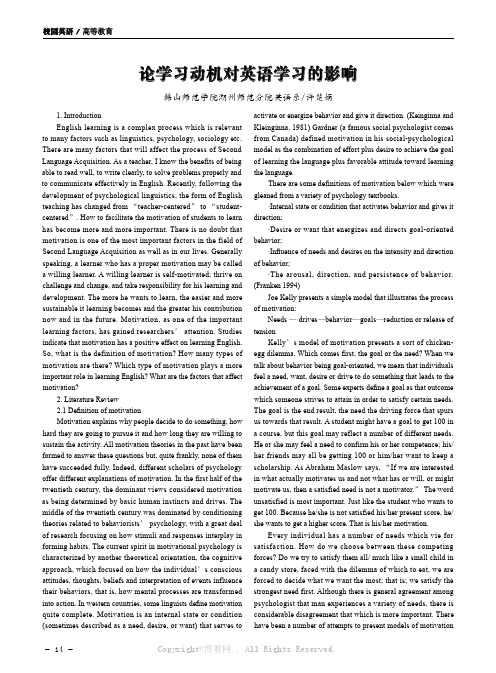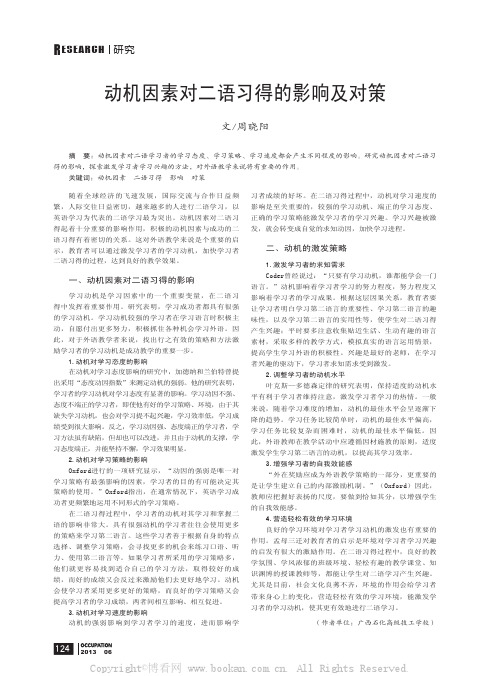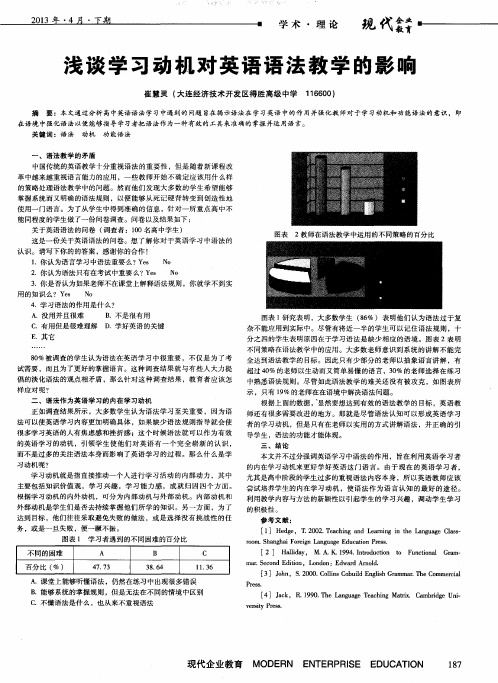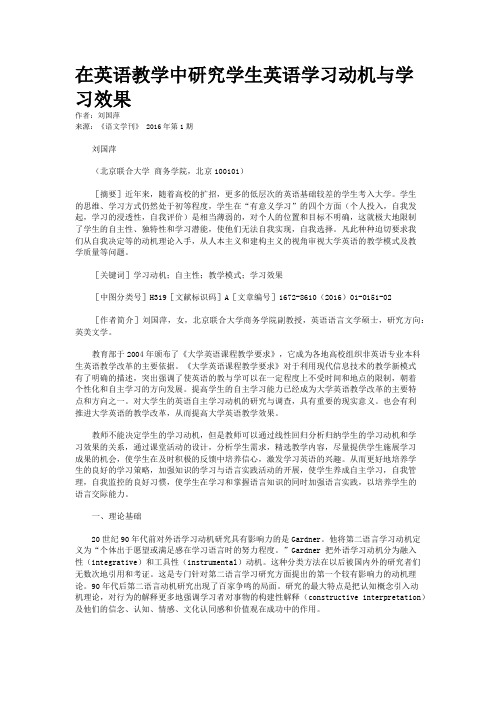英语学习动机对英语学习效果的影响
浅析英语学习动机对中学生英语学习的影响

浅析英语学习动机对中学生英语学习的影响一、英语学习动机的概念英语学习动机是指学习者在学习英语过程中的内在动机和外在动机。
内在动机是指学生对英语学习本身的兴趣和愿望,外在动机是指学生由于外部因素而产生的学习动机,比如学业压力、升学需求等。
英语学习动机主要包括能力动机、情感动机、任务动机和目标动机四个方面。
能力动机是指学生觉得英语学习可以提高自己的能力和技能,情感动机是指学生对英语学习有积极的情感体验,任务动机是指学生认为英语学习任务有挑战性和可行性,目标动机是指学生为了实现某种目标而学习英语。
二、英语学习动机的影响因素英语学习动机受到多种因素的影响,其中包括学习者自身因素、教学环境因素和社会文化因素。
学习者自身因素包括个体差异、个人态度和价值观等,教学环境因素包括教师教学方式、教学资源和学习条件等,社会文化因素包括社会风气、家庭环境和社会认知等。
这些因素会因学生的不同而产生不同的影响,从而对学生的英语学习动机产生影响。
三、英语学习动机对中学生英语学习的影响英语学习动机对中学生的英语学习有着重要的影响。
英语学习动机能够直接影响学生的学习态度和行为。
当学生对英语学习充满热情和动力时,他们会更加主动地参与到学习中,努力学习英语。
而当学生对英语学习充满厌倦和消极情绪时,他们会变得懈怠和不积极,进而影响到学习效果。
英语学习动机还能够影响学生的学习成就和学习效果。
学生有积极的英语学习动机时,他们会更加专注和投入,学习成绩和学习效果自然会有所提升;而学生缺乏英语学习动机时,他们在学习中会感到苦恼和无助,学习成绩和学习效果就不会太好。
英语学习动机还能够影响学生的职业发展和未来发展。
在当今社会,英语已经成为一种重要的职业技能,而拥有良好的英语学习动机的学生更有可能在未来的职业发展中取得成功。
英语学习动机是中学生英语学习过程中的重要因素,它对学生的学习态度、学习行为、学习成就以及未来发展都有着重要的影响。
教育者应该关注学生的英语学习动机,引导学生树立正确的学习动机,创造良好的学习环境,从而促进学生的英语学习,提高他们的学习效果和未来发展。
论学习动机对英语学习的影响

- 14 -校园英语 /论学习动机对英语学习的影响韩山师范学院潮州师范分院英语系/许楚娟1. IntroductionEnglish learning is a complex process which is relevant to many factors such as linguistics, psychology, sociology etc. There are many factors that will affect the process of Second Language Acquisition. As a teacher, I know the benefits of being able to read well, to write clearly, to solve problems properly and to communicate effectively in English. Recently, following the development of psychological linguistics, the form of English teaching has changed from “teacher-centered ” to “student-centered ”. How to facilitate the motivation of students to learn has become more and more important. There is no doubt that motivation is one of the most important factors in the field of Second Language Acquisition as well as in our lives. Generally speaking, a learner who has a proper motivation may be called a willing learner. A willing learner is self-motivated; thrive on challenge and change, and take responsibility for his learning and development. The more he wants to learn, the easier and more sustainable it learning becomes and the greater his contribution now and in the future. Motivation, as one of the important learning factors, has gained researchers ’ attention. Studies indicate that motivation has a positive effect on learning English. So, what is the definition of motivation? How many types of motivation are there? Which type of motivation plays a more important role in learning English? What are the factors that affect motivation?2. Literature Review 2.1 De finition of motivationMotivation explains why people decide to do something, how hard they are going to pursue it and how long they are willing to sustain the activity. All motivation theories in the past have been formed to answer these questions but, quite frankly, none of them have succeeded fully. Indeed, different scholars of psychology offer different explanations of motivation. In the first half of the twentieth century, the dominant views considered motivation as being determined by basic human instincts and drives. The middle of the twentieth century was dominated by conditioning theories related to behaviorists ’ psychology, with a great deal of research focusing on how stimuli and responses interplay in forming habits. The current spirit in motivational psychology is characterized by another theoretical orientation, the cognitive approach, which focused on how the individual ’s conscious attitudes, thoughts, beliefs and interpretation of events influence their behaviors, that is, how mental processes are transformed into action. In western countries, some linguists de fine motivation quite complete. Motivation is an internal state or condition (sometimes described as a need, desire, or want) that serves toactivate or energize behavior and give it direction. (Keinginna and Kleinginna, 1981) Gardner (a famous social psychologist comes from Canada) defined motivation in his social-psychological model as the combination of effort plus desire to achieve the goal of learning the language plus favorable attitude toward learning the language.There are some definitions of motivation below which were gleaned from a variety of psychology textbooks.·Internal state or condition that activates behavior and gives it direction;·Desire or want that energizes and directs goal-oriented behavior;·In fluence of needs and desires on the intensity and direction of behavior;·The arousal, direction, and persistence of behavior. (Franken 1994)Joe Kelly presents a simple model that illustrates the process of motivation:Needs — drives —behavior —goals —reduction or release of tensionKelly ’s model of motivation presents a sort of chicken-egg dilemma. Which comes first, the goal or the need? When we talk about behavior being goal-oriented, we mean that individuals feel a need, want, desire or drive to do something that leads to the achievement of a goal. Some experts de fine a goal as that outcome which someone strives to attain in order to satisfy certain needs. The goal is the end result, the need the driving force that spurs us towards that result. A student might have a goal to get 100 in a course, but this goal may reflect a number of different needs. He or she may feel a need to confirm his or her competence; his/her friends may all be getting 100 or him/her want to keep a scholarship. As Abraham Maslow says, “If we are interested in what actually motivates us and not what has or will, or might motivate us, then a satisfied need is not a motivator.” The word unsatisfied is most important. Just like the student who wants to get 100. Because he/she is not satisfied his/her present score, he/she wants to get a higher score. That is his/her motivation.Every individual has a number of needs which vie for satisfaction. How do we choose between these competing forces? Do we try to satisfy them all/ much like a small child in a candy store, faced with the dilemma of which to eat, we are forced to decide what we want the most; that is; we satisfy the strongest need first. Although there is general agreement among psychologist that man experiences a variety of needs, there is considerable disagreement that which is more important. There have been a number of attempts to present models of motivationCopyright©博看网 . All Rights Reserved.校园英语 /which list a specific number of motivating needs, with the implication that these lists are all inclusive and represent the total picture of needs. Unfortunately, each of these models has weaknesses and gaps.As Robert J.Mckain says, “There is no achievement without goals.” We may say “There is no achievement without motivation.” Motivation is quite important. Most motivation theorists assume that motivation is involved in the performance of all learned responses; that is, a learned behavior will not occur unless it is energized. The major question among psychologist, in general, is whether motivation is a primary or secondary influence on behavior. That still need psychologist to make a further research.2.2 Types of motivationIn general, motivation can be considered as either intrinsic (behavioral, needs) or extrinsic (cognitive and humanistic, reinforcement). Intrinsic motivation is the most fundamental motivation. Intrinsic motivation is generally possessed by people having personal interest(s) in doing something and helping to set their goals. People are intrinsically motivated not because accomplishing the activity they do brings a reward, but because doing the activity itself is a reward. Mark Lepper notes that a student with intrinsic motivation participates in his/her learning for its own sake, for the enjoyment it provides, the learning it permits, or the feelings of accomplishment it evokes. Extrinsic motivation, on the other hand, derives from an anticipation of rewards such as praise, awards, prizes, and evaluation, and fear for punishment. An extrinsically motivated student do the activity in order to obtain some reward or avoid some punishment external to the activity itself, and this kind of motivation refers to learning situations where the reason for doing a task is something other than an interest in the task itself. Comparing these two types of motivation in a classroom, it becomes clear that intrinsic motivation produces more potential benefits than does the extrinsic. Intrinsically motivated students tend to try harder and think more deeply. It is also found by researchers that they tend to prefer more difficult tasks when others tend to choose easier tasks.On the other hand, motivation also can be considered as either integrative motivation or instrumental motivation. Integrative motivation is basically a motivation to be a member of a target society in a foreign country but it also includes a motivation coming from just an interest or a favorable feeling to a target culture or people. McDonough noted that there are two types of integrative motivation; assimilative motivation, strong motivation to belong to the target group, and affiliate motivation, weak motivation and a desire for wider social contact with target language speakers. Learners who are integrative motivated seems to have a strong intrinsic motivation to learn a language. Famous research carried out in the second half of the twentieth century by Gardner and Lambert who described instrumental motivation as a motivation to acquire some advantages by learning a second language suggested that who felt most warmly about a language and who wanted to integrate into the culture of its speakers were more highly motivated and learnt more successfully than those who were only learning language as a means to get a better job. In other words, integrative motivation was more powerful than instrumental motivation. A learner with instrumental motivation regards language as an instrument to get a reward. But whatever kind of motivation students have, it is clear that highly motivated students do better than ones without motivation at all.2.3 The relationship between motivation and learning EnglishSomeone says, motivation is the concept that a student is able to keep interested in, and continue to learn more about, a learn object of goal. Saying in other way, motivation is a tool to achieve a goal. Motivation to learn English is influenced by group related and context related attitudes. If someone want to learn English well, he has to change his life a little, such as: do crazy things like talking to yourself in English or spending your evening reading a dictionary. In order to do these things regularly, he has to enjoy doing them. If he is like most learners and doesn’t feel like doing these things, he will have to work on his motivation, and improve his motivation for learning English. Students are most concerned with motivation for learning. In one of the earliest studies of why well motivated students want to learn English, most said they do so to acquire the necessary knowledge and skill for communicating with target group. While today, another common reason may be to get a high payment job in a foreign company. Wanting to succeed in career motivates them to learn. No matter the motivator, if students can learn more of what they want and less of what they don’t, learning English becomes more appealing. So, students, if you want to learn English well, a clear motivation is quite necessary. However, teachers are not ultimately responsible for their students’ motivation. They can only encourage by word and deed. Real motivation comes from each individual.3. Discussion3.1 Social contextsAs we all know that teenagers are easily affected by others. For example, if the peers of a student have a negative attitude towards learning, a student may not be highly motivated. But if the student is in a school situation where his/her peers having a positive attitude to learning activities, the student will be more highly motivated. If the student is in a household where family members have a positive attitude to school learning activities, such as homework, the student will be motivated to do their homework. If a student is in a family situation in which good grades are not praised and rewarded, a student will probably be less motivated than a student in a family where good grades are praised and rewarded. From the example, we can see that motivation is easily affected by social context. So, it’s important to cultivate an encouraging condition for students to learn English.Copyright©博看网 . All Rights Reserved.- 15 -校园英语 /3.2 Relationships between the teacher and the studentsBesides social context, there is still some factors affected students’ learning motivation. I still remember when I was a junior student, my learning motivation usually influenced by the relationship of the teachers. I liked the subject because I liked the teacher. Now, I wonder, at present, do the students still have such trend? A good relationship may help students to accept the teacher. But in reality, some students’ relationship of teachers is not so good. Some researches indicated: some students do not trust their teacher. “Building trust in a classroom is a slow process and results from many small incidents in which the teacher has responded honestly and dependably.” (James Raffini.1993). Developing a personal relationship with the students and achieving their respect is easier said than done. It is a gradual process built on a foundation whose components include the teacher’s acceptance of the students and ability to listen and pay attention to them. Broadly speaking, if you show commitment towards the students learning progress, there is a very good chance that they will do the same thing. It is important that everybody in the classroom should be aware that you care; that you are not there just for the salary; that it is important for you that your students succeed; that you are ready to work just as hard as the students towards this success. A good relationship between teacher and students needs efforts from both parts. I believe a good relationship would benefit teachers and students.3.3 Some advice of stimulating and maintain students’learning motivationMotivation is rather important for learning English. Some researchers have found that students learn best when motivated. Well motivated students approach learning tasks with confidence, knowing that they have the necessary knowledge and skill to complete them or can adopt a positive approach to ask for help or guidance. Often students are motivated for a variety of reasons, but in every case the motivation leads to learning. Then how to stimulate, arouse and maintain students’ motivation?1) There are some advices below for the teachers.a) Suggest students to set class goals which accepted by the whole class.The teacher may advise the students to negotiate their individual goals and outline a common purpose, and display the final outcome in public, and then help students to make particular activities to attain them.b) Make the teaching materials relevant for the students.As a teacher, find out what your students’ goal are and what topics they want to learn about, and then build these into your curriculum as much as possible. I think, your teaching would be successful. In my opinion, if the subjects are relevant to the everyday experiences and backgrounds of the students, they would more easily accept them.c) Promote cooperation among the students.Encourage cooperation between students has already been mentioned by many researchers. If students are allowed to cooperate with each other towards a certain goal, their expectancy of success is likely to be higher than if they are to work individually. Because they know that they can also count on their peers. They can help each other to succeed.2) Besides some advice for teacher, there is also some advice for the students.a) Imaging your can talk to native speakers just like you talk in your first language.Imagining the possibility of writing e-mail to people from all over the world, I think, you may want to learn English well. If your English is good enough, you can understand English-language TV, talk to native speakers easily, read books in English, write English letters without mistake, etc.b) Try to use English whenever you can.This is very important. Because English is so popular, you can use it everywhere. You can use Goggle to find English-language websites with interesting information, you can watch American cartons, you can play adventure games on your computer, etc. The more you use English, the more you will want to learn it.c) Remember that learning English requires Practice.One small action is more powerful than reading hundreds of articles. It’s very hard to do things, even if they are good for us. That is why not many people speak English well. But if you want to succeed, you have to change something about your life. That means if you want to learn English well, don’t put it off. Begin now.4.ConclusionMotivation is, without question, the most complex and challenging issue facing teachers today. Motivation for learning English has become one of the most important non-intelligence factors affecting the achievement of English learning. Motivation, which we consider it very important, but partly of them doubted. They learn knowledge very quickly while at the same time, they are easily affected by others. So our English teaching have to meet the need of students, cultivate active learning attitude of students, unceasingly improve the teaching method in order to arouse, maintain and protect the students’ learning motivation. References:[1]Herbert,L.P.Motivation:Theory,Research,and Applications[M]. California:Wadsworth Publishing Company,1991.[2]Jeremy,H.How to Teach English[M].Beijing:Foreign Language Teaching and Research Press,2003.[3]P a u l,R.P.a n d D a l e,H.S.M o t i v a t i o n i n E d u c a t i o n: Theory,Research,and Applications[M].New Jersey:Pearson Education,Inc,1991.[4]Zoltan,D.Motivation Strategies in the Language Classroom[M]. Cambridge:Cambridge University Press,2001.Copyright©博看网 . All Rights Reserved.- 16 -。
英语教学中学习动机的应用

英语教学中学习动机的应用引言学习动机在学生的学习过程中起着至关重要的作用,特别是在英语教学中。
学习动机是学习者产生、维持和加强学习行为的内在动力,它直接影响学生的学习成就和学习效果。
本文将探讨学习动机在英语教学中的应用,以及如何激发学生学习英语的动机。
一、学习动机对英语教学的重要性学习动机是学生学习行为的内在动力,它直接影响学生的学习表现和学习成就。
在英语教学中,学习动机尤为重要,因为英语是一门外语,需要学生投入更多的时间和精力来学习。
如果学生缺乏学习动机,他们就很难长时间地持续学习英语,从而影响学习效果。
教师需要在英语教学中注重激发学生学习动机,激发学生学习英语的兴趣和热情。
二、激发学生学习英语的动机1. 设计有趣的教学活动教师可以通过设计各种有趣的教学活动来激发学生学习英语的动机,比如游戏、角色扮演、小组讨论等。
这些活动能够吸引学生的注意力,增强学习的趣味性,从而提高学生的学习积极性。
2. 提供具体的学习目标教师在教学中应该明确提出具体的学习目标,让学生清楚地知道他们正在学习什么,以及学习的重要性。
这样能够让学生有明确的方向和目标,增加他们学习的动力。
3. 创设良好的学习氛围良好的学习氛围能够激发学生学习的兴趣和动机。
教师可以通过营造轻松、愉快的课堂氛围,让学生感到学习是一种快乐和愉悦的事情,从而增加他们学习的动力。
4. 鼓励学生的积极参与教师在教学中应该时刻鼓励学生的积极参与,让他们感受到自己的付出和努力是被认可和赞赏的。
这样能够增加学生的学习动机,激发他们更多地参与到学习中。
5. 提供个性化的学习支持每个学生的学习动机都是不同的,教师应该根据学生的需求和特点,提供个性化的学习支持。
这样能够更好地满足学生的学习需求,增加他们学习的积极性和动力。
三、提高英语教学的效果通过激发学生学习英语的动机,可以有效提高英语教学的效果。
学生会更加积极主动地参与到学习中,更加专注和投入,从而提高学习效率和学习成绩。
学习动机在英语课堂的作用

学习动机在英语课堂的作用在英语学习中,学习动机是非常重要的因素之一。
学习动机可以促进学生的学习兴趣和自我意愿,推动他们积极学习,提高英语学习效果。
本文将从以下三个方面介绍学习动机在英语课堂的作用。
一、增强学习兴趣学习兴趣是学生学习英语的重要驱动力。
如果缺乏学习兴趣,学生可能变得不想学习,扼杀学习英语的热情。
学习动机可以激发学生的学习兴趣。
通过不断地挑战和超越自己,学生可以感受到学习的乐趣和意义。
教师可以通过丰富的教学形式和亲和力强的教学风格,激发学生的学习兴趣,调动他们的学习积极性和热情。
良好的学习动机可以增强学生对英语的兴趣,让学生更愿意投入时间和精力学习英语。
二、促进语言自信心学生的语言自信心是影响他们英语学习效果的因素之一。
缺乏语言自信心的学生,面对英语课堂时可能会感到无从下手,自我怀疑和焦虑。
这种情况下,学生的学习成效可能会受到很大的影响。
学习动机可以促进学生的语言自信心。
学习动机可以让学生在不断摸索过程中积累自信,通过接受挑战,敢于尝试向别人展示自己的语言技能,从而促进自信。
这种对自身能力的信心可以提高学生的自我形象,进而激发学生持续不断地进取,掌握更多的英语知识和技能。
三、提高学习效果良好的学习动机可以提高学生的学习效果。
既然学生具备了学习兴趣和语言自信心,那么他们的学习效率自然会得到提高。
学习动机可以帮助学生集中注意力,尽可能克服困难,从而达到更好的学习成效。
学习动机可以使学生在课堂上更加积极主动,尝试不同的学习方法,提高自己的英语水平。
当学生信心和动力齐飞时,他们的英语学习效果也会得到较大提高,使学生更快乐地掌握英语知识和技能。
总之,学习动机在英语课堂中扮演着至关重要的角色。
学习动机的良好与否直接影响着学生对英语学习的态度、兴趣、自信心和学习效果。
教师可以通过丰富多彩的教学方法和阶段性的目标激发学生的学习动机,让学生在愉悦地学习中不断提高自己的英语学习效果。
动机因素对二语习得的影响及对策

R 研究ESEARCH OCCUPATION2013 06124摘 要:动机因素对二语学习者的学习态度、学习策略、学习速度都会产生不同程度的影响。
研究动机因素对二语习得的影响,探索激发学习者学习兴趣的方法,对外语教学来说将有重要的作用。
关键词:动机因素 二语习得 影响 对策动机因素对二语习得的影响及对策文/周晓阳随着全球经济的飞速发展,国际交流与合作日益频繁,人际交往日益密切,越来越多的人进行二语学习,以英语学习为代表的二语学习最为突出。
动机因素对二语习得起着十分重要的影响作用,积极的动机因素与成功的二语习得有着密切的关系。
这对外语教学来说是个重要的启示,教育者可以通过激发学习者的学习动机,加快学习者二语习得的过程,达到良好的教学效果。
一、动机因素对二语习得的影响学习动机是学习因素中的一个重要变量,在二语习得中发挥着重要作用。
研究表明,学习成功者都具有很强的学习动机。
学习动机较强的学习者在学习语言时积极主动,自愿付出更多努力,积极抓住各种机会学习外语。
因此,对于外语教学者来说,找出行之有效的策略和方法激励学习者的学习动机是成功教学的重要一步。
1.动机对学习态度的影响在动机对学习态度影响的研究中,加德纳和兰伯特曾提出采用“态度动因指数”来测定动机的强弱。
他的研究表明,学习者的学习动机对学习态度有显著的影响。
学习动因不强、态度不端正的学习者,即使他有好的学习策略、环境,由于其缺失学习动机,也会对学习提不起兴趣,学习效率低,学习成绩受到很大影响。
反之,学习动因强、态度端正的学习者,学习方法虽有缺陷,但却也可以改进,并且由于动机的支撑,学习态度端正,并能坚持不懈,学习效果明显。
2.动机对学习策略的影响Oxford进行的一项研究显示,“动因的强弱是唯一对学习策略有最强影响的因素,学习者的目的有可能决定其策略的使用。
”Oxford指出,在通常情况下,英语学习成功者更频繁地运用不同形式的学习策略。
在二语习得过程中,学习者的动机对其学习和掌握二语的影响非常大。
浅谈学习动机对英语语法教学的影响

习动机呢?
者的学习动机 , 但 是只有 在老师 以实用的方式讲解语法 ,并正确 的引
导学生 ,语 法的功能才 能体现 。
三 、 结 论
E .其 它
图表 1研究 表明 ,大多数学 生 ( 8 6 %) 表明他 们认为语法过 于复 杂不能应用到实际中。尽管有将近一半的学生可 以记住语法规则 ,十 分之四的学生表明原因在于学习语法是缺少相应 的语境。图表 2表 明
D .学好英语 的关键
不同策略在语法教学中的应用 。大多 数老师意识到 系统 的讲解不能完
本文并 不过分强调英语学 习中语法 的作 用 ,旨在利用英语 学习者 的内在学 习动机来更好 学好英语 这 门语言 。由于现在 的英语学 习者 , 尤其 是高 中阶段 的学生过 多的重视语法 内容本身 ,所 以英语教 师应该
学习动机就是指直接推动一个人进行学 习活动 的内部动力 ,其 中 主要包括知识价值 观 ,学 习兴趣 ,学 习能力 感 ,成就 归 因四个方 面。
参考 文献:
[ 1 ]H e d g e , 2 0 0 2 . T e a c h i n g a n d L e a r n i n g i n t h e L a n g u a g e C l a s s —
T o o m. S h a n g h a i F o r e i g n L a n g u a g e Ed u c a t i o n P r e s s .
[ 2] H a l i d a y , M. A . K . 1 9 9 4 . I n t r o d u c t i o n t o F u n c i t o n a l G r a m-
在英语教学中研究学生英语学习动机与学习效果

在英语教学中研究学生英语学习动机与学习效果作者:刘国萍来源:《语文学刊》 2016年第1期刘国萍(北京联合大学商务学院,北京100101)[摘要]近年来,随着高校的扩招,更多的低层次的英语基础较差的学生考入大学。
学生的思维、学习方式仍然处于初等程度,学生在“有意义学习”的四个方面(个人投入,自我发起,学习的浸透性,自我评价)是相当薄弱的,对个人的位置和目标不明确,这就极大地限制了学生的自主性、独特性和学习潜能,使他们无法自我实现,自我选择。
凡此种种迫切要求我们从自我决定等的动机理论入手,从人本主义和建构主义的视角审视大学英语的教学模式及教学质量等问题。
[关键词]学习动机;自主性;教学模式;学习效果[中图分类号]H319[文献标识码]A[文章编号]1672-8610(2016)01-0151-02[作者简介]刘国萍,女,北京联合大学商务学院副教授,英语语言文学硕士,研究方向:英美文学。
教育部于2004年颁布了《大学英语课程教学要求》,它成为各地高校组织非英语专业本科生英语教学改革的主要依据。
《大学英语课程教学要求》对于利用现代信息技术的教学新模式有了明确的描述,突出强调了使英语的教与学可以在一定程度上不受时间和地点的限制,朝着个性化和自主学习的方向发展。
提高学生的自主学习能力已经成为大学英语教学改革的主要特点和方向之一。
对大学生的英语自主学习动机的研究与调查,具有重要的现实意义。
也会有利推进大学英语的教学改革,从而提高大学英语教学效果。
教师不能决定学生的学习动机,但是教师可以通过线性回归分析归纳学生的学习动机和学习效果的关系,通过课堂活动的设计,分析学生需求,精选教学内容,尽量提供学生施展学习成果的机会,使学生在及时积极的反馈中培养信心,激发学习英语的兴趣。
从而更好地培养学生的良好的学习策略,加强知识的学习与语言实践活动的开展,使学生养成自主学习,自我管理,自我监控的良好习惯,使学生在学习和掌握语言知识的同时加强语言实践,以培养学生的语言交际能力。
学习动机在英语课堂的作用

学习动机在英语课堂的作用学习动机在英语课堂中起着非常重要的作用。
学习动机是学生学习英语的内在动力,是学生坚持学习的动力来源。
有了良好的学习动机,学生才能更加专注地投入到英语学习中,才能更愿意接受教师的指导和帮助。
在英语课堂中,学习动机可以帮助学生更好地理解知识,提高学习效率,取得更好的学习成绩。
而没有学习动机的学生,往往是无法集中注意力,缺乏学习的动力,导致学习效果大打折扣。
激发学生的学习动机,提高学生的学习积极性,对于教师来说是至关重要的。
激发学生的学习动机有很多方法。
教师可以通过精心设计的教学内容和方式来激发学生的学习动机。
教师可以采用多媒体教学的方式,通过图片、音频、视频等多种形式来呈现知识,使课堂更加生动有趣。
教师还可以设计一些富有趣味性的教学活动,如角色扮演、小组讨论等,让学生在参与活动的过程中不知不觉地提高了学习的兴趣和积极性。
教师还可以根据学生的学习特点和兴趣爱好来调整教学内容和方式,使学生更容易产生学习的兴趣和动力。
教师还可以通过及时的激励和鼓励来激发学生的学习动机。
在学生取得好成绩或者完成一项任务时,教师可以及时给予肯定和奖励,激发学生的学习积极性。
教师还可以给予学生一些实实在在的学习目标,让学生知道自己的努力是有所回报的。
通过这些激励和奖励,学生会更加积极地投入到英语学习中,不断提高自己的学习动机和学习能力。
学生自身也要努力培养良好的学习动机。
要明确自己学习英语的目的和动力来源,树立积极向上的学习态度,培养坚韧不拔的学习意志。
认识到学习英语的重要性,自觉加强英语学习,努力提高自己的英语水平。
要注重调节个人情绪,保持乐观向上的心态,在困难面前不气馁,不放弃,不断地充实自己,提高自己的英语综合素质。
学习动机在英语课堂中起着非常重要的作用。
教师和学生都应该共同努力,通过多种方式激发学生的学习动机,提高学生的学习积极性,达到更好的学习效果。
希望在不久的将来,每个学生都能充分享受到学习英语的乐趣,并取得理想的学习成绩。
- 1、下载文档前请自行甄别文档内容的完整性,平台不提供额外的编辑、内容补充、找答案等附加服务。
- 2、"仅部分预览"的文档,不可在线预览部分如存在完整性等问题,可反馈申请退款(可完整预览的文档不适用该条件!)。
- 3、如文档侵犯您的权益,请联系客服反馈,我们会尽快为您处理(人工客服工作时间:9:00-18:30)。
英语学习动机对英语学习效果的影响作者简介:杨润芹(1984-),女,云南省保山市人,临沧师范高等专科学校外语学院,助教,研究方向:英语语言学,英语教学法。
摘要:学生的英语成绩在很大程度上是和学习英语的动机有关的,这也对老师进行英语教学时有很大影响的。
本文将调查研究高等专科学校的学生,了解他们学习的动机、学习的现状,通过这些调查得到的资料来分析学习动机对英语的学习有什么样的影响,从中可以得出怎么样进行英语教学能够提高学生的英语成绩。
关键词:英语学习;学习动机;学习效果;影响
一、引言
随着人们对研究的不断深入,人们开始了解学习是学生的一种自觉、主动进行的认识知识的行为。
因此,学生自身的一些因素,比如说动机、情绪等,这些因素对外语学习的影响是不能够忽略的。
动机是做任何事情的一个先决条件,如果没有任何动机的话,学习认知活动也是不太可能发生的。
学习动机其实就是在自我的调节的情况之下,自身的需要和外在的环境影响,从而去进行学习的触动因素。
诱发动机的外在因素还是有很多的,因为在这个发展迅速的社会当中,社会上的各个角落都充满了机遇和挑战,对每一个人的能力也提出来了很高的要求,学生是需要去掌握好一门外语的,这就
是学习外语的触发因素。
二、学习动机的分类
学习动机的分类是有很多分类方法的,按照社会心理学上面的标准来划分,动机可以被分为融入性的动机和工具性的动机。
融入性的动机其实就是学生喜欢学习的语言,也对和所学习语言有联系的文化感兴趣,在内心当中渴望成为所学语言国家当中的一个成员,整个社会也需要很乐意接受他,比如说移民。
工具性的动机就是只把学习的语言当做是一种工具,希望通过学习一门语言给自己带来一些好处,比如说获取一些证书。
学习动机还可以从认知心理学上面来分类,这样动机就可以成为内在的和外在的。
内在的动机其实就是外语的学习能够引起学生的兴趣,也能够给学生带来一种愉快的感觉。
外在动机就是学习外语是为了一些外在的原因,比如说为了获取一些奖励。
三、研究学习动机的意义
3.1研究学习动机的必要性
对于不一样的学生来说,学习动机决定了他们在学生上面的态度和积极性是有差别的。
通过对学生学习外语的动机进行分析,这样老师就可以很好地了解学生了。
老师也可以根据学生的学习动机进行针对性教导,可以帮助学生明确学习所需要的态度,这样教学的效果就能够有很大的一个提升。
教师可以在对学生充分了解的基础之上,对学生进行全方位的
分析,寻找到不利于学生学习的一些原因。
这样老师就可以采取一些方法来消除这些不利因素,使学生热爱学习英语,转变被动学习英语为主动学习英语,把学习英语变为一件十分有乐趣的事情。
只有学生树立了良好的学习态度,学生就会自主去进行学习,一旦产生了浓厚的兴趣,学习英语就变得十分简单了。
3.2研究学习动机的重要性
自从改革开放以来,中国和外国的交流大幅度增加。
现在英语已经成为了一门国际上面流通的语言,也是在国际上面运用最多的一种语言,在世界上面也是有着十分重要作用的。
以前学习英语是从初一开始的,而现在英语的学习室从小学三年级开始的,从这上面就可以看出英语的学习是有着十分重要作用的。
学习动机和学习的效率是成一个正比例上升的,也就是说如果你学习的动机越积极,你的学习成绩就会越好。
学习动机也是能够影响能否继续学习的,研究学习动机对英语学习的效果可以帮助学生提升他的英语水平,也能够把教学质量搞上去。
四、高等专科学校英语学习动机调查
为了详细了解一下高等专科学习学生学习英语的动机,笔者设计了一些问题,把它们做成一张调查问卷。
学校里面的一部分学生参与了调查,调查结果显示差不多有百分之七十五的学生学习英语是为了通过四六级考试,其次多的是为了能够顺利大学毕业,一些有远大志向的人是为了出国留学继续深造。
一些学生是受到了外在
环境因素的影响来学习英语的,还有另外的一部分是因为自身的内在要求来进行学习外语的。
从调查结果上面可以看出,大多数的学生学习英语是因为一些外在的因素在影响他们,这些因素占据了主要的导向作用。
这也说明了这些学生是处在一个要我学习的状况,自身还没有一种压迫的意识去学习。
这并不表示没有人去主动学习英语的,他们会主动创造条件来学习英语,任何地方都可能变成他们学习英语的课堂。
五、学习动机对学习效果的积极影响
学习动机是分为两种的,首先来说一说外在动机对学习效果的影响。
在某种意义上面来说,外在的动机其实就是一种别样的动力。
在这种动力之下,学生会忘记学习英语的烦扰,苦心研究为了获取一个好的成绩,在满足自己的愿望的时候,客观来说学生的学习成绩还是得到了一定程度提高的。
内在的动机就和外在的不一样了,在取得一个成功的时候,学生回去想着如何赢取下一个成功,所以内在动机在英语的学习当中是有着很重要作用的。
六、激发学生的学习动机,提高学习的效果
有时候学生的学习动机是处于一个待激活的状态,这就需要老师去创造一些条件来触发学习动机。
激发学习动机的方式有很多,老师可以增加学生的自信心,比如说老师可以在课堂上面对所以的学生平等看待,多鼓励学生,当他们犯错的时候少一些批评的声音。
老师还需要让学生明确自己所以学习的任务,这样学生才能够参与
到课堂上面来,充分感受到主动学习的乐趣。
老师可以把课堂氛围弄得比较放松,这样学生感受到的压力比较小,时间长了学生对英语学习的兴趣也就高了。
老师需要和学生建立一个良好的关系,随时帮助学生解决学习当中的问题。
在这种氛围之下,学生的学习成绩自然会大幅度提高。
(作者单位:临沧师范高等专科学校)参考文献
[1]周娟.学习动机对大学英语学习的影响的初步探析[j].湖北:郧阳师范高等专科学校学报,2012(2): 122-125.
[2]王裕冲.激发大学生英语学习动机提高大学生英语学习效果[j].安徽:安徽工业大学学报,2002(1): 130-131.。
